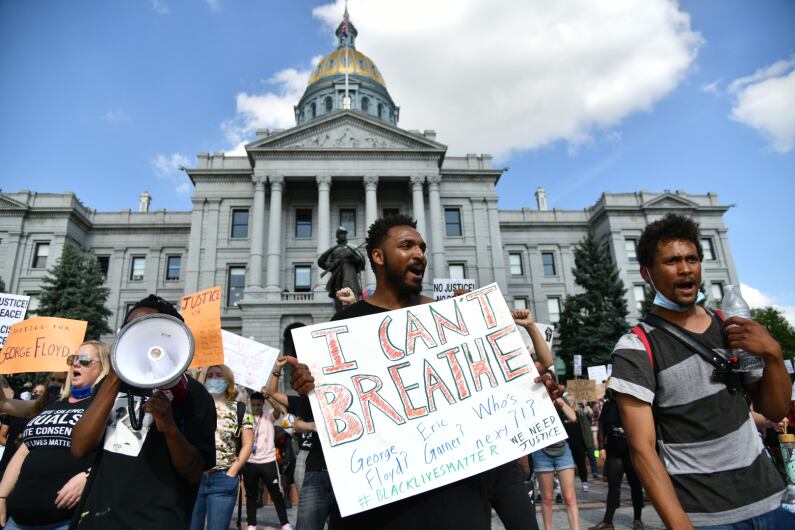The morning after heated protests erupted in Denver over the police killing of George Floyd, school district leaders pledged to “stand up for justice,” and one school board member renewed his call to remove police officers from the district’s schools.
Denver Public Schools Superintendent Susana Cordova and three of the district’s seven school board members made a statement Friday on Facebook Live about the killing in Minneapolis.
“These events must serve as a reminder that we still have much work to do in creating more inclusive environments,” Cordova said. “As a district, we have a responsibility to make sure that we are doing our part to foster empathy and kindness. Our schools are the diverse playing grounds where our youth can learn acceptance and belonging.”
On Twitter, school board member Tay Anderson called to end Denver Public Schools’ contract with the Denver Police Department to staff the district’s secondary schools with “school resource officers,” or SROs. Anderson said he was at the protest Thursday at the state Capitol when Denver police fired tear gas and pepper spray to disperse the crowd.
He said he saw young people — Denver Public Schools students — running from the gas.
“To see they were part of those tear gassed and shot at with rubber bullets, it breaks my heart,” Anderson said. Friday was the last day of school in Denver, but he said that when students return to school in August, “the last thing I want is for our kids to be greeted with SROs.”
With protests continuing on Friday, Denver Mayor Michael Hancock canceled a planned celebration for the Class of 2020. The Colorado General Assembly, which had just reconvened after a two-month hiatus related to the coronavirus, also closed temporarily, delaying budget hearings.
Floyd, who was black, died Monday after a white Minneapolis police officer kneeled on his neck for more than eight minutes. The officer was arrested on Friday on charges of third-degree murder and manslaughter.
Floyd’s killing and the police response to protests across the country have revived calls to remove police from schools. In Minneapolis, a school board member tweeted Friday that he had drafted a resolution to cut ties with that city’s police department.
Advocacy groups have long called for Denver Public Schools to cancel its contract with the Denver Police Department, which assigns 18 officers to work in secondary schools. The district also has its own force of armed and unarmed campus security officers.
Having police in schools is especially harmful for students of color, advocates say. District statistics show black students, who make up 13% of students in Denver, are far more likely than white students to be suspended, expelled, handcuffed, or referred to law enforcement.
The city and school district split the cost of the school resource officers. Denver Public Schools was slated to pay $721,403 for the program this school year, though the switch to remote learning in March saved the district about $200,000, a spokesperson said.
As the district looks at having to cut tens of millions of dollars from next year’s budget in a coronavirus-damaged economy, Anderson said the police contract should be among the reductions. He agrees with community groups that want to see that money redirected to hire more school nurses and counselors to meet students’ mental health needs.
It’s not clear if a majority of school board members would agree to cancel the police contract. The board has not ever voted on the contract separate from the entire budget since it costs less than $1 million. Anderson said he supports a proposal from another board member, Scott Baldermann, to lower the $1 million threshold and give the board more spending oversight.
“I’m tired of the vigils. I’m tired of the statements. I’m tired of the hashtags,” said Anderson, a recent Denver Public Schools graduate and community activist who has led past protests. “Our black children in DPS need to know that they matter. … We have to follow up with actions.”
Board Vice President Jennifer Bacon said the school district has a role by teaching students not only reading, writing, and math “but that they know who they are in this world and their place as leaders.” Bacon, who has pushed the district to better support black students, said the district must respond to students’ cries to learn more about their history, for example.
“What we saw last night and what those experienced last night ... was profoundly unacceptable on a lot of levels,” Bacon said. “The reason people were out there is unacceptable. The anger and fear and trauma that this nation, and particularly those with black skin, are feeling is unacceptable. To the extent to which we can do something, we need to do it.”






